Interview: Poet Matthew Thorburn on 'This Time Tomorrow'
|
|||||||||||||||||
|
The scholar John Rodden calls the literary interview a “fully-fledged genre.” I used to be skeptical, but after assigning my students at The College of Saint Rose to speak with an author, I’m more inclined to think the literary interview qualifies as a distinct form of performance. I put out a call on Facebook and Twitter: Would you speak to a college student about your book? I asked. Sure, they said. Review copies were sent, students selected authors, read and researched their work, and asked questions. - Daniel Nester, Contributing Word Editor |
POET MATTHEW THORBURN ON ‘THIS TIME TOMORROW’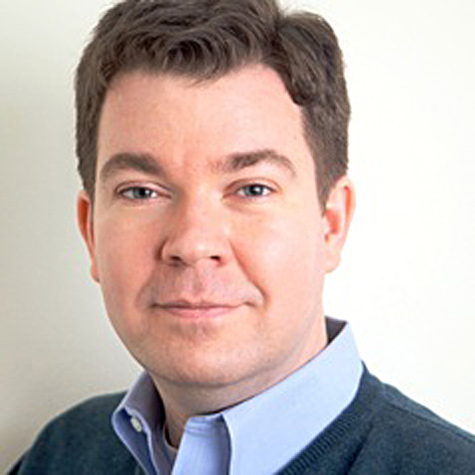 |
||||
INTERVIEWED BY
|
New York poet Matthew Thorburn is the author of poetry books Subject to Change and Every Possible Blue. Matthew took time out of his busy schedule for a phone interview about his new collection as well as This Time Tomorrow, his a book-length poem. Over the phone, his voice calm and relaxed, we discussed his writing process, his new collection, where he draws his inspiration from, what it means to be a poet, and what it is like to live in the city. KRISTA LIUZZI: In your poems you mention a lot about the city; what it’s like to live there and having it as your inspiration. MATTHEW THORBURN: I enjoy it a lot. I grew up in the Midwest, in Michigan, and I moved out here in 1999 when I started grad school to study business. It was a big change for me, but I really enjoy it so I stayed here. I have been writing about it quite a bit in this book and also in my other writings. My inspiration to write comes from the many different neighborhoods and the things that catch your eye. LIUZZI: If there were one thing that you could take with you from Michigan and put in New York City what would it be? THORBURN: I guess one thing would be the people that I know there. These include my friends and family. Specifically, my parents, cousins, aunts, uncles and other people I see a couple times a year still live there. LIUZZI: You are currently working on two new projects. Are they like the poems that are in this book or are they different? THORBURN: I have some different things that I am working on. I have a book coming out soon called This Time Tomorrow. That it is almost done. The book consists of poems based on traveling and experiences in other countries and cultures. It all takes place in Japan, Iceland, and China. It is very different from my newest book. I am working now on a book-length poem that takes place in the city, mostly in the Bronx, Riverdale, and New Jersey, over the course of a year. It has been different for me to work on this project in sections. It is a poem that is approximately fifty pages long LIUZZI: How do you write? Old school with a typewriter, or do you go modern and sit down with a computer? Or do you sit down and write it out longhand? If you write longhand do you use arrows to move work around? THORBURN: Usually I start off with those first few ideas, in a notebook or a piece of paper. Once I have a few of those then I will move to the computer and start typing it up. I really like to see the line breaks. So, for me it really helps to see it in types, and where the lines are and the breaks. Definitely the line breaks are easier to do on the computer, and then you can move the word up or down. Like cut and pasting stuff. LIUZZI: How do you think about the details? What I mean is: do you start big and work small, or the opposite? THORBURN: Usually there are small details that trigger the poem for me—for instance, misreading that “Men’s wear” sign at Macy’s as “Men swear.” And then as I’m working on the poem I’ll start to see how those details fit together into something larger and (hopefully) take on a bigger meaning. LIUZZI: Men do swear. That’s funny. Did you have any problems or challenges publishing this book? THORBURN: This was my second book. With my first book I sent out to contests like most people do. I forget how many, but quite a few. I think within about 12 months’ cycle of sending it to a bunch of different contests…one of them finally won and found a place to be published. Then this book; I sent it out in different versions to different contest and some reading periods… I think for about five years it took for different versions…to find a publisher. It was a finalist a few times; it came close to winning a prize, but it never got picked up. All that time I wrote my other book. LIUZZI: There is a poem that you wrote called “Dark Chocolate Cake with Dark Chocolate Pudding.” What’s the story behind that one? THORBURN: The cake is made-up in a way (sorry to say). But I liked the sound of it repeating word chocolate in there. The poem itself was based on going to a very crowded, holiday party where I didn’t know people too well. So it inspired this poem. LIUZZI: When you get writer’s block, how do you cope? How do you relate to writer’s block? THORBURN: There are a couple of things that I do. I heard once that, “you don’t have to be writing all the time.” So I try to remember to do that a lot. Even thought I should be working on something. Other advice I heard was to sit down and start writing; even if you write horrible stuff you are still exercising muscles, and eventually you will write something good. These days I work a 9-to-5 job. I commute back and forth to the Bronx and Manhattan. I wish that I had more time to write but usually I’ve got something in mind or something to revise. With the book-length poem, that is always something I can dig into. But these days, that is something I am not [able to] deal with, because I have so much going on. But if I had more [time], these tools would be what I would use. Also going to readings and hearing other people’s poems. Listening can be very inspiring, if you hear something really good, you start thinking of the lines or the images. LIUZZI: How long have you been writing poetry? Have you always written poetry? THORBURN: I started writing poems when I was in high school, in my senior year. I have been writing since then for about 20 years. I have been writing since that time. In college, I had to write fiction for a while along with short stories. I really didn’t like that so much so I switched back over to poetry. In the last five to six years I have been trying to write book reviews and essays trying to see what that is like. But for me I think that my interest would be in poetry. LIUZZI: When you are finished with a book how do you promote it? Do you use social networking websites, or does your editor this help promote your books? THORBURN: The press has their own website, which is pretty basic these days. They send out flyers in the mail to bunch of people about the book. There is a little bit of social media. I used to talk to different poets I know and people who read the book. I do have a website where I blog, not a very updated blog, but I keep people informed about updates. The main thing for me though would be for me to get book out there would be a reading from the book so people could hear the poems. LIUZZI: You said you were working on a project where you mention “China, Iceland, and Japan.” Have you ever travelled to those places? THORBURN: Those were places that I actually travel to. Later on when I came home, I wrote about them; in a way I am remembering about the trip. As I was writing the poem, I would be doing research about the places to make sure I had the facts right. LIUZZI: What’s the best part of editing? What do you like most about it? THORBURN: That to me is the best part. Where you are in the middle of writing something and it is quite not there but you are revising. But, as you have said, I move things around. I tend to write, I start a poem, and I have different thoughts that I write down. Normally it is just bits and pieces that I fit together. Rather than writing a poem from the beginning and editing straight through like a rough draft. As far as revising, I found a lot with writing this book-length poem, it is about cutting things out and trying to be tougher on what stuff I like. Like maybe I like this line but it won’t add to the poem. Things like that, so it is just getting the heart of the poem and what the poem is. |
||||
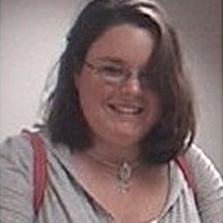 |
|||||
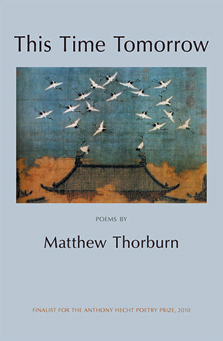 |
|||||
|
Visit Matthew Thorburn… |
|||||










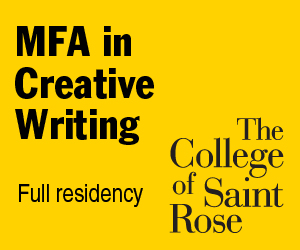
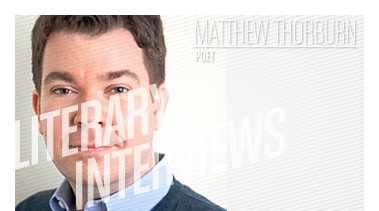
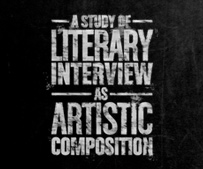














 Stated
Stated
Reader Comments